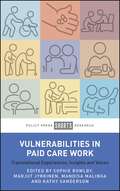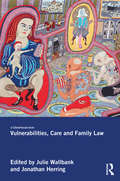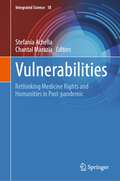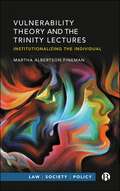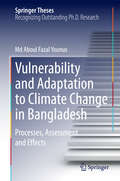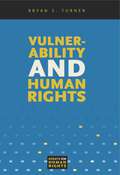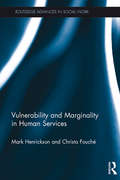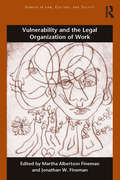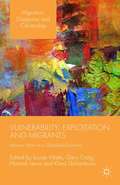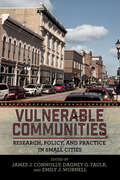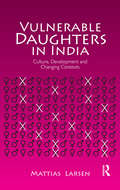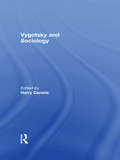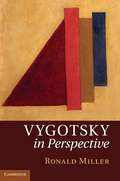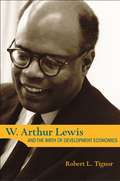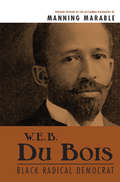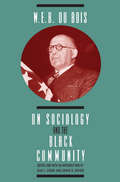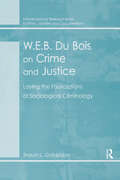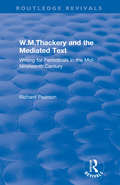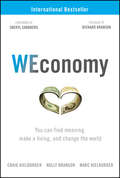- Table View
- List View
Vulnerabilities in Paid Care Work: Transnational Experiences, Insights and Voices
by Sophie Bowlby, Marjut Jyrkinen, Mandisa Malinga and Kathy SandersonThe need for paid care workers to provide professional, good quality care for those needing daily support continues to grow throughout the world. This book explores the recent experiences of diverse paid care workers in four very different national contexts – Finland, Canada, South Africa and England – to learn from their experiences during COVID-19 and its aftermath. Drawing on care workers’ own perspectives, this book shows how recruitment and retention of paid care workers remains challenging due to the pandemic and demographic changes, their precarious labour market position, low pay and the difficulties of delivering care.
Vulnerabilities, Care and Family Law
by Jonathan Herring Julie WallbankWhile in the past family life was characterised as a "haven from the harsh realities of life", it is now recognised as a site of vulnerabilities and a place where care work can go unacknowledged and be a source of social and economic hardship. This book addresses the strong relationships that exist between vulnerability and care and dependency in particular contexts, where family law and social policy have a contribution to make. A fundamental premise of this collection is that vulnerability needs to be analysed in a way that gets at the heart of the differential power relationships that exist in society, particularly in respect of access to family justice, including effective social policy and law targeted at the specific needs of families in mutually dependent caring relationships. It is therefore crucial to critically examine the various approaches taken by policy makers and law reformers in order to understand the range of ways that some families, and some family members, may be rendered more vulnerable than others. The first book of its kind to provide an intersectional approach to this subject, Vulnerabilities, Care and Family Law will be of interest to students and practitioners of social policy and family law.
Vulnerabilities: Rethinking Medicine Rights and Humanities in Post-pandemic (Integrated Science #18)
by Stefania Achella Chantal MaraziaDrawing from a wide array of disciplinary perspectives and geographical contexts, this volume offers new insights for critically engaging with the problem of vulnerability. The essays here contained take the move from the COVID-19 pandemic, in order to explore the inherent vulnerability of individuals, but also of social, economic and political systems, and probe the descriptive and prescriptive import of the concept.Each chapter provides a self-contained perspective on vulnerability, as well as a specific methodological framework for questioning its meaning. Taken together, the chapters combine into a multi-disciplinary toolkit for approaching the various forms and structures of vulnerability, with a special attention to the intersectional factors shaping the individual experience of it: from gender to age, from disability to mental illness, from hospitalisation to incarceration. The book explores the theoretical richness and complexity of the concept and proposes new analytical approaches to it, before illustrating its multifariousness through empirically grounded case studies. The closing section engages with “the future of vulnerability”, as a hermeneutic, epistemological, and critical-normative perspective to be deployed beyond the domain of global crises and emergencies.The volume is primarily intended as a reference for scholars in the human, social and health sciences. The accessible structure and plain language of the chapters make it also a valuable didactic resource for graduate courses in philosophy, the social sciences and public health.
Vulnerability Theory and the Trinity Lectures: Institutionalizing the Individual (Law, Society, Policy)
by Martha Albertson FinemanVulnerability theory offers an alternative to social-contract and rights-based paradigms. Beginning with the corporeal body, the theory argues we are inevitably and constantly dependent on social institutions that are generated (and ideally monitored) through law. Accordingly, vulnerability theory argues for a state attentive to the needs of the universally 'vulnerable subject'. Based on lectures at Trinity College Dublin that focused on four foundational concepts, this book highlights how vulnerability theory differs from individualistic liberal frameworks. Calling for a reorientation of law toward a collective responsibility-based approach, it is essential reading for anyone interested in political theory, social justice, and sociolegal scholarship.
Vulnerability and Adaptation to Climate Change in Bangladesh
by Md Aboul Fazal YounusThe IPCC (2007) warned that the Ganges Brahmaputra Meghna (GBM) basin will be at greatest risk due to increased flooding, and that the region's poverty would reduce its adaptation capacity. This book investigates autonomous adaptation using a multi-method technique comprising PRA and a questionnaire survey applied in the case study area 'Islampur' Upazila in Bangladesh. The study has four key approaches. First, it reviews the flood literature for Bangladesh from 1980 to 2014. Second, it examines farmers' crop adaptation processes in a case study area at Islampur, Bangladesh. Third, it assesses the vulnerability and adaptation (V & A) in response to three extreme flood events (EFEs). Fourth, the book assesses the economic consequences of failure effects of autonomous crop adaptation in response to EFEs. The results show that Bangladeshi farmers are highly resilient to EFEs, but the economic consequences of failure effects of autonomous crop adaptation (FEACA) on marginal farmers are large. The book contributes to current knowledge by filling three important research gaps as follows, 1) farmers' autonomous crop adaptation processes in response to various types of extreme floods; 2) methodological contribution for assessing vulnerability and adaptation through PRA; and 3) the economic consequences of the failure effects of autonomous crop adaptations. "This book provides a good account of 'autonomous adaptation' and its impact on fl ood vulnerable communities in Bangladesh. Anyone wishing to fully understand the impact of climate change should read the book. " Professor Muhammad Yunus, Nobel Laureate, Yunus Centre, Bangladesh
Vulnerability and Human Rights (Essays on Human Rights #1)
by Bryan S. TurnerThe mass violence of the twentieth century’s two world wars—followed more recently by decentralized and privatized warfare, manifested in terrorism, ethnic cleansing, and other localized forms of killing—has led to a heightened awareness of human beings’ vulnerability and the precarious nature of the institutions they create to protect themselves from violence and exploitation. This vulnerability, something humans share amid the diversity of cultural beliefs and values that mark their differences, provides solid ground on which to construct a framework of human rights.Bryan Turner undertakes this task here, developing a sociology of rights from a sociology of the human body. His blending of empirical research with normative analysis constitutes an important step forward for the discipline of sociology. Like anthropology, sociology has traditionally eschewed the study of justice as beyond the limits of a discipline that pays homage to cultural relativism and the “value neutrality” of positivistic science. Turner’s expanded approach accordingly involves a truly interdisciplinary dialogue with the literature of economics, law, medicine, philosophy, political science, and religion.
Vulnerability and Marginality in Human Services (Routledge Advances in Social Work)
by Christa Fouché Mark HenricksonVulnerability has traditionally been conceived as a dichotomised status, where an individual by reason of a personal characteristic is classified as vulnerable or not. However, vulnerability is not static, and most, if not all, people are vulnerable at some time in their lives. Similarly, marginality is a social construct linked to power and control. Marginalised populations are relegated to the perimeters of power by legal and political structures and limited access to resources. Neither are fixed or essential categories. This book draws on international research and scholarship related to these constructs, exploring vulnerability and marginality as they intersect with power and privilege. This exploration is undertaken through the lenses of intimacy and sexuality to consider vulnerability and marginality in the most personal of ways. This includes examining these concepts in relation to a range of professions, including social work, psychology, nursing, and allied health. A strong emphasis on the fluidity and complexity of vulnerability and marginality across cultures and at different times makes this a unique contribution to scholarship in this field. This is essential reading for students and researchers involved with social work, social policy, sociology, and gender and sexuality studies.
Vulnerability and the Legal Organization of Work (Gender in Law, Culture, and Society)
by Martha Albertson Fineman Jonathan W. FinemanThis book uses the concepts of vulnerability and resilience to analyze the situation of individuals and institutions in the context of the employment relationship. It is based on the premise that both employer and employee are vulnerable to various social, economic, and political forces, although differently so. It demonstrates how in responding to those complementary institutional relationships of employer and employee the state unequally and inequitably favors employers over employees. Several chapters included in this collection also consider how the state shapes, creates and maintains through law the social identities of employer and employee and how that legal regime operates as the allocation of power and privilege. This unique and fundamental role of the state in defining the employment relationship profoundly affects the respective abilities and degree of resiliency of actual employers and employees. Other chapters explore how attention to the respective vulnerability and resilience of those who do and those who direct work in assessing the employment relationship can raise fundamental questions of social justice and suggest new avenues for critical engagement with labor and employment law. Collectively, these pieces articulate a framework for imaging what would constitute an appropriately "Responsive State" in the employment context and how those interested in social justice might begin to use the concepts of vulnerability and resilience in their arguments.
Vulnerability, Exploitation and Migrants: Insecure Work in a Globalised Economy (Migration, Diasporas and Citizenship)
by Louise Waite Gary Craig Hannah Lewis Klara SkrivankovaGlobalization, the economic crisis and related policies of austerity have led to a growth in extreme exploitation at work, with migrants particularly vulnerable. This book explores the lives of the growing numbers of severely exploited labourers in the world today, questioning how we can respond to such globalized patterns of extreme inequality.
Vulnerable Children and the Law
by Edited by Rosemary Sheehan Helen Rhoades Nicky StanleyGlobal support for improving child welfare and upholding the rights of children is strong, but in practice often fails to recognise the emerging gap between traditional child welfare practices and the evolving nature of child vulnerability. This book takes an international perspective on child welfare, examining how global and national frameworks can be adapted to address the rights and best interests of children. Synthesising the latest international research, experts redefine the concept of a 'child in need' in a world where global movement is common and children are frequently involved in the law. The book considers children as citizens, as refugees, victims of trafficking, soldiers, or members of indigenous groups and identifies the political and cultural changes that need to take place in order to deliver rights for these children. Focusing in particular on child protection systems across nations, it identifies areas of child welfare and family law which systematically fail to look after the best interests of children, often through prejudice, outdated practice, or even the failure of agencies to work together. Exploring the nexus between children's rights and the law across the globe, this book makes essential reading for policymakers, social workers, lawyers, researchers and professionals involved in protecting vulnerable children.
Vulnerable Communities: Research, Policy, and Practice in Small Cities
by Greg GoodnightVulnerable Communities examines the struggles of smaller cities in the United States, those with populations between 20,000 and 200,000. Like many larger metropolitan centers, these places are confronting change within a globalized economic and cultural order. Many of them have lost their identities as industrial or commercial centers and face a complex and distinctive mix of economic, social, and civic challenges. Small cities have not only fewer resources but different strengths and weaknesses, all of which differentiate their experiences from those of larger communities.Vulnerable Communities draws together scholars from a broad range of disciplines to consider the present condition and future prospects of smaller American cities. Contributors offer a mix of ground-level analyses and examinations of broader developments that have impacted economically weakened communities and provide concrete ideas for local leaders engaged in redevelopment work. The essays remind policy makers and academics alike that it is necessary to consider cultural tensions and place-specific conflicts that can derail even the most well-crafted redevelopment strategies prescribed for these communities.
Vulnerable Daughters in India: Culture, Development and Changing Contexts
by Mattias LarsenIn India, girls are aborted on a massive scale merely because they are girls. Underlying this widespread problem is the puzzling fact that daughters have become vulnerable in a time of general improvement of welfare, female status and deep economic and social changes. The findings centre on a contradiction between the continued importance of the cultural factors which for so long have established that a son is necessary, and socio-economic changes that are challenging the importance of these very same factors. This contradiction entails an uncertainty over sons fulfilling expectations which has, rather than tilt the balance in favour of daughters, instead increased the relative importance of sons and intensified negative consequences for daughters. The original findings are based on set theoretic systematic comparisons of eight villages in Himachal Pradesh that facilitate a reconceptualization and an alternative analysis that takes contextual differences into account. It builds on extensive fieldwork and collection of both qualitative and quantitative data.
Vygotsky and Sociology
by Harry DanielsBuilding on earlier publications by Harry Daniels, Vygotsky and Sociology provides readers with an overview of the implications for research of the theoretical work which acknowledges a debt to the writings of L.S. Vygotsky and sociologists whose work echoes his sociogenetic commitments, particularly Basil Bernstein. It provides a variety of views on the ways in which these two, conceptually linked, bodies of work can be brought together in theoretical frameworks which give new possibilities for empirical work. This book has two aims. First, to expand and enrich the Vygotskian theoretical framework; second, to illustrate the utility of such enhanced sociological imaginations and how they may be of value in researching learning in institutions and classrooms. It includes contributions from long-established writers in education, psychology and sociology, as well as relatively recent contributors to the theoretical debates and the body of research to which it has given rise, presenting their own arguments and justifications for forging links between particular theoretical traditions and, in some cases, applying new insights to obdurate empirical questions. Chapters include: Curriculum and pedagogy in the sociology of education; some lessons from comparing Durkheim and Vygotsky Dialectics, politics and contemporary cultural-historical research, exemplified through Marx and Vygotsky Sixth sense, second nature and other cultural ways of making sense of our surroundings: Vygotsky, Bernstein, and the languaged body Negotiating pedagogic dilemmas in non-traditional educational contexts Boys, skills and class: educational failure or community survival? Insights from Vygotsky and Bernstein. Vygotsky and Sociology is an essential text for students and academics in the social sciences (particularly sociology and psychology), student teachers, teacher educators and researchers as well as educational professionals.
Vygotsky in Perspective
by Ronald MillerLev Vygotsky has acquired the status of one of the grand masters in psychology. Following the English translation and publication of his Collected Works there has been a new wave of interest in Vygotsky, accompanied by a burgeoning of secondary literature. Ronald Miller argues that Vygotsky is increasingly being 'read' and understood through secondary sources and that scholars have claimed Vygotsky as the foundational figure for their own theories, eliminating his most distinctive contributions and distorting his theories. Miller peels away the accumulated layers of commentary to provide a clearer understanding of how Vygotsky built and developed his arguments. In an in-depth analysis of the last three chapters of Vygotsky's book Thinking and Speech, Miller provides a critical interpretation of the core theoretical concepts that constitute Vygotsky's cultural-historical theory, including the development of concepts, mediation, the zone of proximal development, conscious awareness, inner speech, word meaning and consciousness.
Vögel aus Federn: Verschriftlichungen des Vogels seit 1800 (Cultural Animal Studies #12)
by Laura M. Reiling Manuel Förderer Cristine HuckDie Beiträge des Bandes bestimmen mit interphilologischem Blick Formen der Literarisierung und Ästhetisierung des Vogels seit 1800 im Kontext aktueller naturpolitischer Diskurse und kulturwissenschaftlicher Theoriebildung. Über Epochen- und Gattungsgrenzen hinweg werden Darstellungs- und Schreibmodi von Mensch-Natur-Verhältnissen untersucht, in denen der Vogel als Reflexionsfigur ökologischer, sozialer und poetologischer Diskurse fungiert. Das Ergebnis ist eine literarisch-ornithologische Bestandsaufnahme in historischer wie systematischer Perspektive, die die Bedeutung des Vogels als Texttier der Moderne unterstreicht.
W. Arthur Lewis and the Birth of Development Economics (Princeton Legacy Library)
by Robert L. TignorW. Arthur Lewis was one of the foremost intellectuals, economists, and political activists of the twentieth century. In this book, the first intellectual biography of Lewis, Robert Tignor traces Lewis's life from its beginnings on the small island of St. Lucia to Lewis's arrival at Princeton University in the early 1960s. A chronicle of Lewis's unfailing efforts to promote racial justice and decolonization, it provides a history of development economics as seen through the life of one of its most important founders.If there were a record for the number of "firsts" achieved by one man during his lifetime, Lewis would be a contender. He was the first black professor in a British university and also at Princeton University and the first person of African descent to win a Nobel Prize in a field other than literature or peace. His writings, which included his book The Theory of Economic Growth, were among the first to describe the field of development economics.Quickly gaining the attention of the leadership of colonized territories, he helped develop blueprints for the changing relationship between the former colonies and their former rulers. He made significant contributions to Ghana's quest for economic growth and the West Indies' desire to create a first-class institution of higher learning serving all of the Anglophone territories in the Caribbean.This book, based on Lewis's personal papers, provides a new view of this renowned economist and his impact on economic growth in the twentieth century. It will intrigue not only students of development economics but also anyone interested in colonialism and decolonization, and justice for the poor in third-world countries.
W. E. B. Du Bois: Black Radical Democrat
by Manning Marable'Marable's biography of Du Bois is the best so far available.' Dr. Herbert Aptheker, Editor, The Correspondence of W.E.B. Du Bois 'Marable's excellent study focuses on the social thought of a major black American thinker who exhibited a 'basic coherence and unity' throughout a multifaceted career stressing cultural pluralism, opposition to social inequality, and black pride.' Library Journal Distinguished historian and social activist Manning Marable's book, W. E. B. Du Bois: Black Radical Democrat, brings out the interconnections, unity, and consistency of W. E. B. Du Bois's life and writings. Marable covers Du Bois's disputes with Booker T. Washington, his founding of the NAACP, his work as a social scientist, his life as a popular figure, and his involvement in politics, placing them into the context of Du Bois's views on black pride, equality, and cultural diversity. Marable stresses that, as a radical democrat, Du Bois viewed the problems of racism as intimately connected with capitalism. The publication of this updated edition follows more than one hundred celebrations recently marking the 100th anniversary of Du Bois's The Souls of Black Folk. Marable broadens earlier biographies with a new introduction highlighting Du Bois's less-known advocacy of women's suffrage, socialism, and peace and he traces his legacy to today in an era of changing racial and social conditions.
W. E. B. DuBois on Sociology and the Black Community (Heritage Of Sociology Ser.)
by W.E.B. DuBoisHistorian, journalist, educator, and civil rights advocate W. E. B. Du Bois was perhaps most accomplished as a sociologist of race relations and of the black community in the United States. This volume collects his most important sociological writings from 1898 to 1910. The eighteen selections include five on Du Bois's conception of sociology and sociological research, especially as a tool in the struggle for racial justice; excerpts from studies of black communities in the South and the North, including The Philadelphia Negro; writings on black culture and social life, with a selection from The Negro American Family; and later works on race relations in the United States and elsewhere after World War II. This section includes a powerful fiftieth-anniversary reassessment of his classic 1901 article in the Atlantic in which he predicted that "the problem of the twentieth century is the problem of the color line." The editors provide an annotated bibliography, a lengthy overview of Du Bois's life and work, and detailed introductions to the selections. "The most significant contribution of this book is its inclusive look at Du Bois as both academic and activist. . . . Individuals interested in the study of social issues and political sociology would benefit from reading and discussing this book."—Paul Kriese, Sociology: Reviews of New Books "Green and Driver, informing this volume with a 48-page essay that summarizes Du Bois' career and places him in the context of the profession, have intelligently organized his writings. . . . A welcome contribution that should have wide use."—Elliott Rudwick, Contemporary Sociology
W.E.B. Du Bois on Crime and Justice: Laying the Foundations of Sociological Criminology (Interdisciplinary Research Ser. In Ethnic, Gender And Class Relations Ser.)
by Shaun L. GabbidonThis is the first book to discern the contribution of Du Bois' work to criminology and criminal justice through a comprehensive review of his papers, articles and books. Beginning with reflections from his childhood, the author traces Du Bois' ideas on crime and justice throughout his life. This includes a unique analysis of Du Bois' experience as an object of the criminal justice system, a review of his FBI file, his 1951 trial and his pioneering social scientific research program at Atlanta University. The book illustrates the depth of Du Bois' interest in the field and reveals how he was a pioneer in key areas of criminology and criminal justice. The book contains five appendices which include four original papers written by Du Bois as well as maps from The Philadelphia Negro.
W.M.Thackery and the Mediated Text: Writing for Periodicals in the Mid-Nineteenth Century (The\nineteenth Century Ser.)
by Richard PearsonThis title was first published in 2000: Thackeray's "minor writings" remain caught in a debate about what constitutes "literature" and whether magazine writing and journalism might be construed as such. This debate was present during the inception of the mass periodical press in the 1830s when Thackeray began his career and forms part of the context of, reasoning within, and techniques of Thackeray's work. Throughout his career, Thackeray was enmeshed in critical arguments about periodicals, novels, "realism" and commercialism. He was himself both (and neither) journalist and literary artist and was at once a product of and critical of emerging writing practices. This book argues that an understanding of Thackeray's writings for periodicals and the literary and commercial context of these is central to an understanding of his literary achievement. Focusing principally on the foundational part of his career, from 1833-1847, but relating this to the novels, particularly "Pendennis" and "The Adventures of Philip" and the "Cornhill Magazine" of the 1860s, the book explores Thackeray's ambiguous response to the burgeoning periodical press, and considers his negotation and critique of the market-place through a variety of publishing media.
WADA, the World Anti-Doping Agency: A Multi-Level Legitimacy Analysis (Routledge Research in Sport and Corruption)
by Daniel Read James Skinner Daniel Lock Aaron C.T. SmithExamining the legitimacy of the World Anti-Doping Agency, this book offers a critical analysis of the anti-doping system and the social and behavioural processes that shape policy, asking why the current system is failing. Featuring in-depth, contemporary case studies from around the world, including the whereabouts system; Lance Armstrong; therapeutic use exemptions; the Essendon Bombers; recreational drugs policy; and the Russian Olympic doping programme, this is the first text to analyse empirically how the legitimacy of WADA is constructed, contested and managed in the field of anti-doping, and the consequent impact this has on anti-doping. Based on the analysis of these case studies, the book discusses how legitimacy processes have shaped the current regulatory environment and offers structural and governance reforms to improve anti-doping policy design and implementation. Adopting a unique theoretical perspective, rooted in a socio-cognitive perspective on organisational behaviour, this book is essential reading for any researcher or student working on drugs and doping in sport, sport management, the sociology of sport, governance, transnational organisations or strategic management. It also offers important insights for policymakers and administrators working in sport or in government.
WEconomy: You Can Find Meaning, Make A Living, and Change the World
by Craig Kielburger Marc Kielburger Sheryl Sandberg Sir Richard Branson Holly BransonYour guide to ‘Business with Benefits'... for All! Purpose and profit are powerful human motivators. Combined, this power can change the world. WEconomy is your guidebook to the greatest evolution in business since the assembly line. Discover the secret to achieving purpose with profit in your career and company, all while driving positive impact. Do you crave more meaning in your job? This book is your roadmap. Are you seeking to inspire employees? CEOs are discovering that purpose is the key to increasing productivity and retaining top performers. If you’re in sales, unleash the power of purpose to inspire customers to be passionate brand ambassadors. If you are an aspiring social entrepreneur, learn how to massively scale your mission. Get paid to change the world — who wouldn’t want to be the person doing that? Uncover the methods of megastars like Oprah Winfrey, Earvin “Magic” Johnson, and Sir Richard Branson, who make the world a better place through purposeful—and highly successful—business strategies. The stellar authorial team share in candid detail, the setbacks and achievements they experienced building successful enterprises and charities—with purpose. With the tips inside this book, you, your business, or your charity can: Find a cause that drives you and your career goals to new heights Create a job that you love and be celebrated by your peers, boss, and industry Inspire brand fanatics to stay loyal to you, your company, and your cause Add a halo to your product, grow your geographic reach, innovate for “the next big thing,” engage Boomers to Gen Z, and much more! This is your blueprint for living by your personal values, achieving career success, and changing the world. Purpose and profit are the greatest human motivators. This is the definitive roadmap for bringing the power of both forces together—achieving purpose with profit in your career, company, and changing the world. Do you crave more meaning in your job? This book will give you the roadmap. Are you seeking to inspire employees? CEOs are discovering that purpose is the secret to increasing productivity and retaining top workers. If you’re in sales, unleash the power of purpose to inspire customers to be passionate brand ambassadors. Everyone wants more meaning. We all inherently know that purpose is powerful, but this is the ground-breaking book to unleashing the purpose within your career, company, and life goals. This book will show you how to profit with purpose, whether you’re the one calling the shots or a junior employee looking to advance. Get paid to change the world – who wouldn’t want to be the person doing that? Discover the methods of megastars like Oprah Winfrey, Earvin “Magic” Johnson, and Sir Richard Branson, who make the world a better place through purposeful—and highly profitable—business strategies. Go behind the scenes of real companies at the forefront of this watershed movement and learn from business leaders, entrepreneurs, celebrities, and aspiring influencers. The all-star authorial team shares in candid detail the setback
WFH (Working From Home): How to build a career you love when you're not in the office
by Harriet Minter'Harriet Minter offers a one-stop resource for those working from home or those who want to work from home but are still sceptical.' - The Financial Times' . . . a must-read for post-Covid times.' - People Management MagazineThe no bullsh*t guide to getting your work and life on track in the new flexible workplace.Virtually every industry is making lasting changes that will open doors to a more flexible working week. So how do we adjust, thrive and excel in an environment where glitchy daily video conferences are the norm?By turns fierce, funny and highly practical, Harriet Minter will show you the skills to be effective and creative during the day-to-day. Harriet breaks down how to be an inspiring and energising manager (either remotely or to a flexibly working team), how to create and thrive in a high-trust culture (on a small and large scale) and most importantly how to achieve your ambition and propel your career forwards.Packed full of hard-won tricks, tips and tools, Harriet Minter draws on her own experience as a careers coach and adviser to companies on their flexible working culture to help you bring your best self to work - from your living room.
WFH (Working From Home): How to build a career you love when you're not in the office
by Harriet MinterThe no bullsh*t guide to getting your work and life on track in the new flexible workplace.Virtually every industry is making lasting changes that will open doors to a more flexible working week. So how do we adjust, thrive and excel in an environment where glitchy daily video conferences are the norm?By turns fierce, funny and highly practical, Harriet Minter will show you the skills to be effective and creative during the day-to-day. Harriet breaks down how to be an inspiring and energising manager (either remotely or to a flexibly working team), how to create and thrive in a high-trust culture (on a small and large scale) and most importantly how to achieve your ambition and propel your career forwards.Packed full of hard-won tricks, tips and tools, Harriet Minter draws on her own experience as a careers coach and adviser to companies on their flexible working culture to help you bring your best self to work - from your living room.(P)2021 Quercus Editions Limited
WFH (Working From Home): How to build a career you love when you’re not in the office
by Harriet MinterThe no bullsh*t guide to getting your work and life on track in the new flexible workplace.Virtually every industry is making lasting changes that will open doors to a more flexible working week. So how do we adjust, thrive and excel in an environment where glitchy daily video conferences are the norm?By turns fierce, funny and highly practical, Harriet Minter will show you the skills to be effective and creative during the day-to-day. Harriet breaks down how to be an inspiring and energising manager (either remotely or to a flexibly working team), how to create and thrive in a high-trust culture (on a small and large scale) and most importantly how to achieve your ambition and propel your career forwards.Packed full of hard-won tricks, tips and tools, Harriet Minter draws on her own experience as a careers coach and adviser to companies on their flexible working culture to help you bring your best self to work - from your living room.
